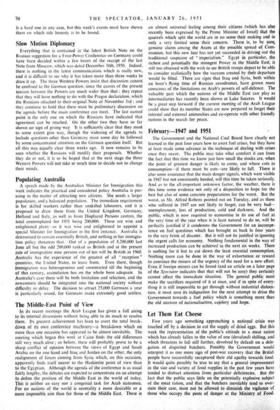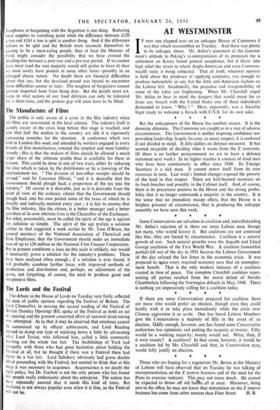Let Them Eat Cheese
Five years ago something approaching a national crisis was touched off by a decision to cut the supply of dried eggs. But this week the representation of the public's attitude to a meat ration which has already fallen to the value of one (devalued) shilling, and which threatens to fall still further, devolved by default on a dele- gation of dispirited butchers. Possibly the Government would interpret it as one more sign of post-war recovery that the British people have successfully recaptured their old apathy towards food. It would quite possibly be true to say that a general improvement in the size and variety of food supplies in the past few years have tended to distract attention from particular deficiencies. But the fact that the public says little on the potentially explosive subject of the meat ration, and that the butchers inevitably tend to over- state their case, must not be allowed to diminish the vigilance of those who occupy the posts of danger at the Ministry of Food. luughness in bargaining with the Argentine is one thing. Reducing meat supplies to vanishing point while the difference between £120 a ton and f104 a ton is split is another thing. And if the difference refuses to be split and the British must reconcile themselves to ceasing to be a meat-eating people, then at least the Minister of Food might consider the possibility that we have crossed the dividing-line between a post-war and a pre-war period. If we cannot have meat (and the vast majority would still prefer to have it) then we must surely have protein in some other form—possibly in an enlarged cheese ration. No doubt there are financial difficulties about that too, but the devalued pound was bound to encounter those difficulties sooner or later. The toughest of bargainers cannot prevent imported food from being dear. But the people must cat. Gaps in vital sectors of our food defences can only be tolerated for a short time, and the protein gap will soon have to be filled.







































 Previous page
Previous page